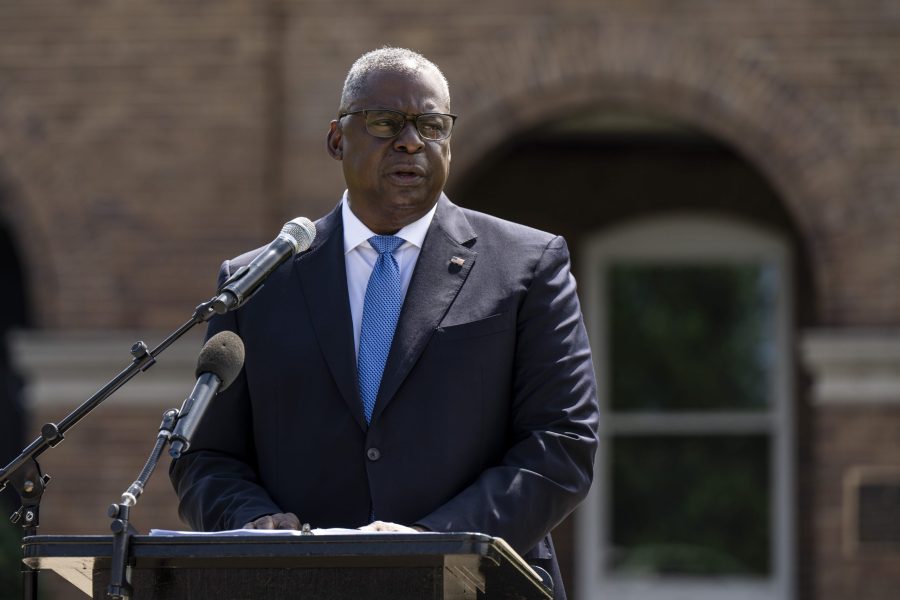Secretary of Defense Lloyd J. Austin III underwent a surgical procedure for prostate cancer and is expected to make full recovery, the Pentagon said Jan. 9.
The announcement ended days of mystery surrounding Austin’s medical status, which was kept under wraps from the White House, Congress, and the media, despite complications from treatment that landed the Pentagon chief in the hospital on Jan. 1, where he remains.
“On Dec. 22, 2023, after consultation with his medical team, he was admitted to Walter Reed National Military Medical Center and underwent a minimally invasive surgical procedure called a prostatectomy to treat and cure prostate cancer,” Dr. John Maddox and Dr. Gregory Chesnut the Walter Reed National Military Medical Center said in a Jan. 9 statement. The Dec. 22 hospital stay was not disclosed by the Pentagon until Jan. 5.
“His prostate cancer was detected early, and his prognosis is excellent,” the doctors added.
But Austin developed complications from the procedure, which led him to be rushed to the hospital in an ambulance on Jan. 1 in severe pain, according to Pentagon Press Secretary Air Force Maj. Gen. Patrick S. Ryder and medical officials. Austin landed in the intensive care unit the following day after he was diagnosed with a urinary tract infection and a buildup of fluid in his abdomen.
“His infection has cleared,” the doctors said in their statement. “He continues to make progress, and we anticipate a full recovery, although this can be a slow process.”
Congress has demanded answers as to why lawmakers and the public weren’t notified until Jan. 5 that Austin was in the hospital. The White House was notified only a day earlier, and President Joe Biden did not know Austin had cancer until Jan. 9.
“Nobody in the White House knew that Secretary Austin had prostate cancer until this morning, and the President was informed immediately after,” National Security Council spokesperson John Kirby told reporters on Jan. 9.
“He was not informed until last Friday that Secretary Austin was in the hospital,” Kirby said of Biden’s knowledge of the situation. “He was not informed until this morning that the root cause of that hospitalization was prostate cancer.”
“It is not optimal for a situation like this to go as long as it did without the commander-in-chief knowing about it or the National Security Adviser or, frankly, other leaders at the Department of Defense,” Kirby added. “That’s not the way this is supposed to happen.”
Ryder said the matter was “deeply personal,” which is why Austin took so long to inform the public and the president, whom Austin spoke by phone with on Jan. 6.
“I recognize I could have done a better job ensuring the public was appropriately informed,” Austin said in a statement that day. “I commit to doing better.”
Prostate cancer is one of the most common cancers among American men, behind only skin cancer. Austin, 70, falls in a particularly high-risk group.
“Most prostate cancers are found in men over the age of 65,” according to the American Cancer Society. “Prostate cancer happens more often in Black men than in men of other races and ethnicities.”
The White House has expressed confidence in Austin despite the fact that President Biden was not promptly informed of a Cabinet member’s serious medical condition, which led Austin to delegate some authority to Deputy Secretary of Defense Kathleen Hicks from Jan. 2-5, the day when the Pentagon first told Congress and the media that Austin had been hospitalized.
The failure by Austin and his top aides to notify others of his hospitalization has led the Pentagon to immediately change procedures to require more disclosure and clarity when the secretary of defense delegates authority. The department is also conducting a 30-day internal review of the matter.
Rep. Mike Rogers, the Alabama Republican who chairs the House Armed Services Committee said on Jan. 9 that he has begun an inquiry into the Pentagon’s delay in disclosing Austin’s hospitalization.
“Everything from on-going counterterrorism operations to nuclear command and control relies on a clear understanding of the Secretary’s decision-making capacity,” Rogers wrote in a letter to Austin. “The Department is a robust institution, and it is designed to function under attack by our enemies, but it is not designed for a Secretary who conceals being incapacitated.”
Austin has resumed his full duties, but Hicks will likely fill in for Austin at some in-person events, defense officials said. It is unclear when Austin will return to the Pentagon.
“We’ll continue to work hard to make sure that we’re being as transparent as possible moving forward and wish the Secretary a speedy recovery,” Ryder said.

